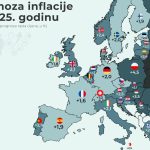ZAGREB, November 14, 2018 – The Council of the European Union for foreign affairs will thoroughly analyse the general election held in Bosnia in October in an effort to resolve the problem of the “marginalisation” of Croats in that country and them being put in a “subordinate position,” Croatian Prime Minister Andrej Plenković said in Parliament on Wednesday, speaking about Bosnia-Herzegovina elections.
Plenković presented his report on the last four meetings of the European Council, two formal meetings held late June and mid-October and two informal sessions – one in Sofia in May and the other in Salzburg held mid-September.
The prime minister expressed his satisfaction with the way his stance on Bosnia and Herzegovina and the status of the Croat people was accepted at the EU summit in Brussels in October. Within the framework of foreign affairs, Plenković spoke about Bosnia and Herzegovina following the 7 October general election in that country in which the majority Bosniak population once again outvoted the Croat population and elected the Croat member to the country’s tripartite presidency.
“We consider that it is not good to have that situation, which seems to be unjust and which hinted at that the Croat people in Bosnia and Herzegovina are marginalised and that they are in a subordinate position, ” Plenković told the parliament.
“The thing that we managed to succeed in and that is essential for the continuation of that debate, is that Deputy Prime Minister and Minister of European Affairs, Marija Pejčinović Burić will speak on behalf of Croatia at the Foreign Affairs Council on Monday at the meeting that is supposed to approach in detail an analysis of the general election in Bosnia and Herzegovina and to consider what and how EU member states and the Union, as such, can do, while trying to solve the issue, in the dialogue with institutions in Bosnia and Herzegovina and political parties with regard to that problem, which objectively has a very unpleasant nature for the equality of Croats in Bosnia and Herzegovina.”
Plenković underscored that that is in no way interfering in the affairs of another country but that Croatia legitimately advocates the compliance with the Dayton accord of which it is a cosignatory.
Speaking of the EU summit meeting in Sofia, Plenković said that it also focused on the digital agenda and innovations as well as relations with Iran and EU-USA trade relations.
Plenković said that Croatia should invest more in the ICT sector, considering the fact that in 2017, as many as 8.4 million people were employed in that sector in the European Union, while currently a mere 35,000 people had jobs in the ICT sector in Croatia. If we want to catch up with digitisation, we must invest more in companies specialised in ICT, he added.
Plenković pointed out the significance of the EU-Western Balkan summit in Sofia, which was held at the initiative of Bulgarian Prime Minister Boyko Borissov. This event filled the 15-year hiatus at the level of the European Council concerning dialogue with neighbours, Plenković said recalling that no meeting of this format had been held since the summit meeting in Thessaloniki in 2003.
The EU-Western Balkans summit in Sofia last May brought together the heads of state or government from EU member states and from the 6 Western Balkans partners: Albania, Bosnia and Herzegovina, Serbia, Montenegro, Macedonia and Kosovo. The closing declaration about European prospects for Western Balkan countries welcomed Croatia’s intention to organise the next EU-Western Balkans summit during its presidency of the Council of the European Union in the first half of 2020.
“Croatia is pursuing a policy that is fairly more open towards the enlargement process than policies in many EU member-states are,” Plenković told MPs.
Commenting on Brexit, Plenković said that Croatia’s position was that the departure of the U.K. from the Union should be orderly and well prepared after that “unfortunate referendum” was held with the outcome for the exit.
For more on Croatia and the EU, click here.







